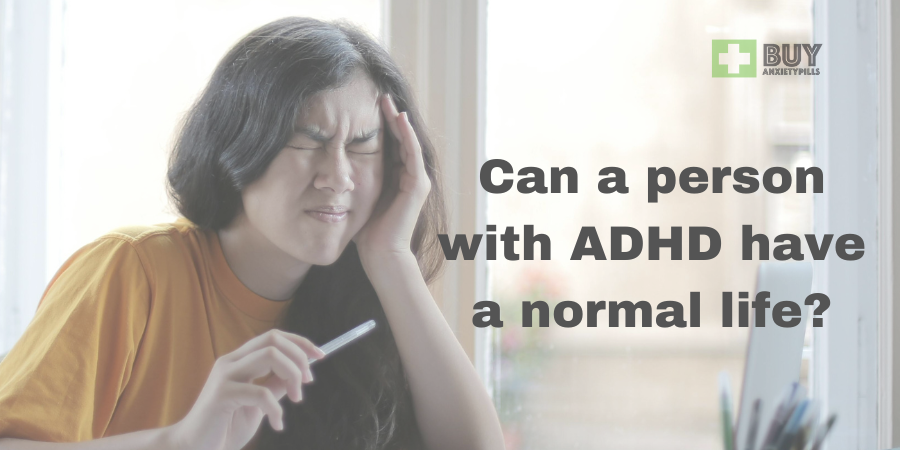- Your cart is empty
- Continue Shopping
Can a person with ADHD have a normal life?

What is ADHD?
ADHD stands for Attention Deficit Hyperactivity Disorder. It is a common neurodevelopmental disorder that begins in childhood and can persist into adulthood.
The main symptoms of Attention Deficit Hyperactivity Disorder include inattention, hyperactivity, and impulsivity. People with ADHD struggle to focus and pay attention, are excessively active, have trouble controlling impulses, and can be easily distracted.
ADHD is a prevalent mental disorder frequently identified in children. The CDC reports that as of 2016, approximately 6.1 million children in the United States have been diagnosed with ADHD, accounting for around 9.4% of all children. Research indicates that ADHD often continues into adulthood in approximately have received a diagnosis of ADHD as of 2016. This represents about 9.4% of all children. Studies show that ADHD persists into adulthood in about 50-80% of cases. One of the best medicine to treat ADHD is Adderall. You Can Buy Adderall Online at our online pharmacy and get up to 20% discount On all Medicines.
The exact causes of Attention Deficit Hyperactivity Disorder are not fully understood, but research suggests it may be due to an imbalance in brain chemicals and low levels of dopamine. Genetics also play a major role, as ADHD tends to run in families. Other potential factors include brain injuries, environmental toxins like lead, and premature birth. In this article, we talk about can a person with ADHD have a normal life?
Challenges of Living with ADHD
Attention deficit hyperactivity disorder (ADHD) can present many challenges in daily life. Here are some of the most common areas where people with ADHD struggle:
Difficulties in School
- Hard time paying attention during lectures and completing assignments.
- Easily distracted by noises, visual stimuli, or thoughts.
- Disorganization and forgetting due dates.
- Impulsiveness and interrupting others frequently.
- Hyperactivity and inability to sit still for long periods.
These issues can lead to poor performance, conflicts with teachers, and lower self-esteem. ADHD makes learning more difficult, though not impossible.
Problems at Work
- Trouble staying focused and completing tasks.
- Forgetting important details or making careless mistakes.
- Lateness and absenteeism.
- Impulsively saying or doing inappropriate things.
- Disorganization and missing deadlines.
Positive Aspects of ADHD
While ADHD presents challenges, it can also come with positive traits that allow those with ADHD to thrive in the right environment. Many with Attention Deficit Hyperactivity Disorder possess high energy, enthusiasm, and creativity that can be harnessed productively.
The high activity levels and energy associated with Attention Deficit Hyperactivity Disorder can enable people to accomplish a lot when properly channeled. Those with ADHD may have a constant flow of ideas and an eagerness to try new things. Their enthusiasm can be infectious and inspire others.
Additionally, studies show that those with Attention Deficit Hyperactivity Disorder often excel in creativity and outside-the-box thinking. Their minds may make more associations between disparate concepts. Many influential entrepreneurs, artists, and innovators throughout history have been suspected of having Attention Deficit Hyperactivity Disorder. The ability to hyperfocus can also lead to bursts of creative output.
Treatment Options
There are several effective treatment options available for managing Attention Deficit Hyperactivity Disorder symptoms and living a normal, fulfilling life:
Medication
- Stimulants like Adderall, Ritalin, Vyvanse – These are the most common medications prescribed for ADHD. They help increase focus and concentration by stimulating the central nervous system.
- Non-stimulants like Strattera, Intuniv – These medications work differently than stimulants and can be effective alternatives, especially if stimulants cause unwanted side effects.
- Finding the right medication and dosage is key – It often takes some trial and error to find the Attention Deficit Hyperactivity Disorder medication that works optimally with minimal side effects. Many people need to adjust dosages over time as well.
Lifestyle Changes
- Exercise and proper nutrition – Regular exercise and healthy eating habits can greatly improve focus and concentration. They also help manage stress and improve sleep quality.
- Routine, planning and organization – Establishing structure through scheduling, task lists, calendars and other organizational systems can provide stability. Routines help ensure important tasks don’t slip through the cracks.
- Stress management – Managing stress levels through adequate rest, relaxation techniques, social connection and balance can improve Attention Deficit Hyperactivity Disorder symptoms. Lowering stress makes it easier to manage challenges.
- Support network – Having a strong support system of understanding family, friends, teachers or coworkers is extremely helpful.
Focus Techniques
- When working, eliminate potential distractions like phone notifications and music.
- Take frequent short breaks when doing tasks that require concentration.
- Use productivity techniques like time boxing to minimize procrastination.
- Try noise-cancelling headphones or instrumental music to reduce auditory distractions.
- If possible, work in a quiet space away from disruptions.
Support Networks
- Find an ADHD coach or organizer to help devise systems and strategies.
- Join an ADHD support group to share advice and experiences.
- Explain ADHD needs and challenges to family, friends, coworkers. Their support can make a difference.
- See a therapist or counselor if ADHD is causing stress, depression, or relationship issues. Talk therapy can help develop coping skills.
Examples of Successful People with ADHD
Attention deficit hyperactivity disorder (ADHD) is a common neurological condition that makes it challenging to regulate attention, thoughts, and actions. While ADHD can pose difficulties, it does not prevent someone from living a normal, successful life. In fact, many highly accomplished individuals have ADHD, demonstrating that the disorder does not have to be an impediment.
Celebrities
Several celebrities have been open about their Attention Deficit Hyperactivity Disorder diagnoses and struggles. Comedian and talk show host Jimmy Kimmel frequently jokes about his ADHD tendencies. Pop singer Justin Timberlake has also candidly discussed how ADHD affected his childhood and career. Actor Adam Levine has credited his ADHD for making him more creative. Other stars like Simone Biles, Michael Phelps, and Ty Pennington have shared their experiences managing Attention Deficit Hyperactivity Disorder in the public eye.
Entrepreneurs
Several prominent entrepreneurs attribute their business success partly to their ADHD minds. Billionaire Richard Branson, founder of Virgin Group, says it has fueled his creativity and risk-taking. David Neeleman created JetBlue Airways while managing his Attention Deficit Hyperactivity Disorder symptoms. Founder of ketchup brand Sir Kensington’s, Scott Norton, views his Attention Deficit Hyperactivity Disorder as an asset that enables quick problem-solving. The ability to hyperfocus, multitask, and think divergently can aid entrepreneurs with Attention Deficit Hyperactivity Disorder in developing innovative ideas and products. It is prevalent among entrepreneurs, suggesting the traits can lend themselves well to starting businesses.
Overcoming Obstacles
Having ADHD can make certain aspects of life more challenging. But with persistence, resilience, and hard work, it is possible to overcome obstacles and live a fulfilling, successful life.
Developing persistence is key – being able to keep going even when faced with setbacks or difficulties. Start small and break large goals down into more manageable steps.
Practicing resilience also helps in bouncing back after mistakes or failures. Reframing negative thinking, fostering social connections, and focusing on self-care can all build resilience.

